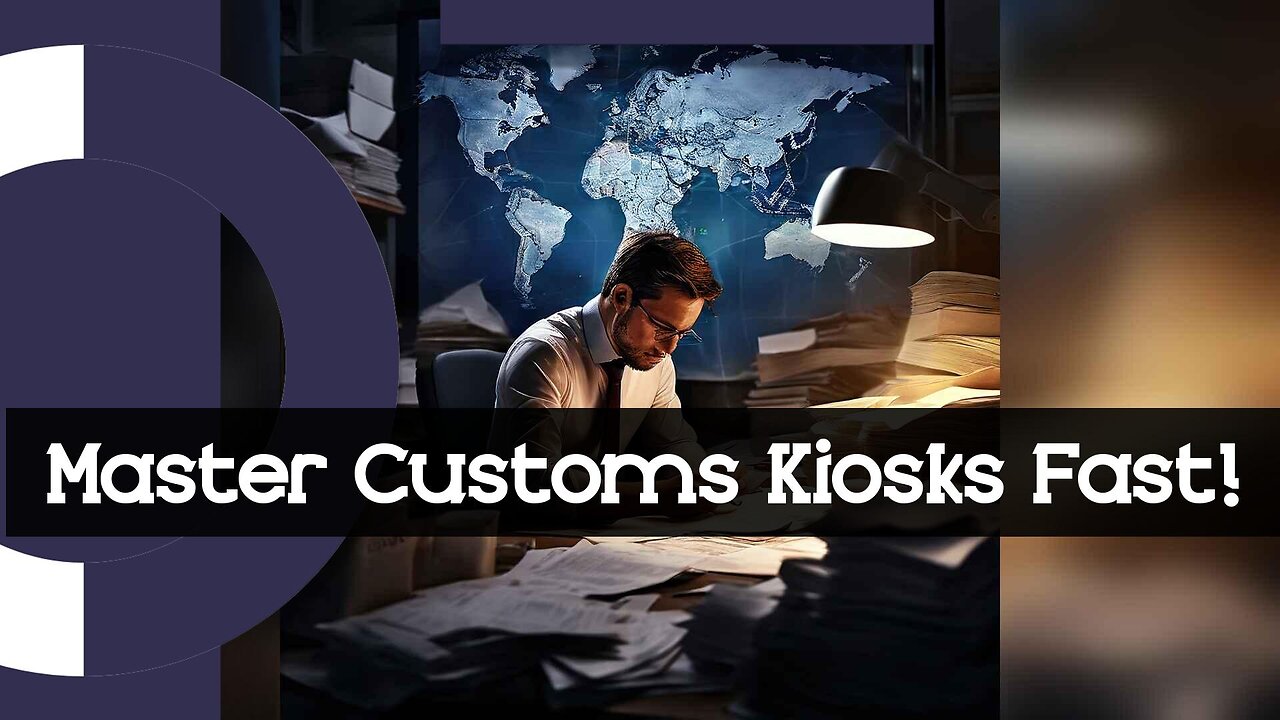Premium Only Content

Maximizing Efficiency: Navigating Self-Service Kiosks for Customs Clearance
ISF Template | 562-453-7357 | isf@isftemplate.com | www.isftemplate.com
In this episode of our customs brokerage series, we delve into the topic of using self-service kiosks for customs clearance at the port of entry. Self-service kiosks have gained popularity in recent years as a convenient way for importers to expedite their customs clearance process. However, it's important to understand the requirements and limitations associated with using these kiosks to ensure a smooth and efficient experience.
Not all ports of entry offer self-service kiosks for customs clearance, so it's crucial to check with the specific port to determine availability. If self-service kiosks are available, it is important to ensure that you meet the eligibility requirements, which may include having a registered business, a valid importer number, and compliance with customs regulations.
When using a self-service kiosk, you will typically need to provide various documents electronically, such as the Importer Security Filing (ISF), commercial invoice, and packing list. It's important to ensure you have all required paperwork readily available and properly organized.
One of the significant benefits of using self-service kiosks is the speed and efficiency they offer. These kiosks streamline the process by allowing importers to enter information electronically and complete necessary customs procedures more quickly. This can help reduce wait times and expedite the release of goods.
After successfully completing the customs clearance process at a self-service kiosk, you will receive a customs clearance receipt. It is important to keep this receipt as proof of compliance with customs procedures and to cross-check the details for accuracy.
While self-service kiosks offer efficiency, it's important to be aware that they may not handle complex or unique import scenarios that require personalized attention from a customs broker. In such cases, it is best to seek assistance from a customs broker to ensure compliance and proper handling of the shipment.
Lastly, it's important to note that self-service kiosks do not substitute the requirement for a customs bond. A customs bond is a financial guarantee that ensures compliance with customs regulations and payment of duties and taxes. Regardless of whether you choose to use self-service kiosks, having a customs bond in place is essential.
In conclusion, using self-service kiosks for customs clearance at the port of entry can be a convenient and efficient option. However, it's necessary to understand the requirements, limitations, and potential challenges associated with these kiosks. Always stay informed about the specific requirements and procedures at your chosen port of entry to ensure a smooth customs clearance process.
#usimportbond
#isfcustomsbroker
#uscustomsclearing
#isfentry
Video Disclaimer Here: This video is designed for education and is unaffiliated with US government bodies.
00:24 - Self-service kiosks have become increasingly popular at the port of entry, offering importers a convenient way to expedite their customs clearance process.
00:42 - It's important to note that not all ports of entry offer self-service kiosks for customs clearance.
01:04 - Once you've confirmed the availability of self-service kiosks, it's crucial to ensure that you meet the eligibility requirements to use them.
01:26 - When using a self-service kiosk for customs clearance, you'll typically be required to provide various documents electronically.
-
 3:12:08
3:12:08
MyronGainesX
4 hours ago $21.39 earnedDan Bongino Named As Deputy Director Of FBI And CPAC Recap
53K16 -
 DVR
DVR
vivafrei
4 hours agoBarnes Live from Seattle - Defending Benshoof in a Case that is CRAY CRAY!
66.9K22 -
 2:12:12
2:12:12
Robert Gouveia
4 hours agoLiberals EXPLODE over Elon's Email; Lawsuits FLY; Sanctions?? Congrats Dan!
40.7K10 -
 1:33:36
1:33:36
Redacted News
5 hours agoBREAKING! PUTIN LAUNCHES MASSIVE OFFENSIVE IN UKRAINE AS EUROPEAN LEADERS PUSH FOR MORE WAR
109K200 -
 44:39
44:39
Kimberly Guilfoyle
5 hours agoBetter Days Ahead for the FBI, Live with Asm Bill Essayli & John Koufos | Ep.199
58.9K24 -
 1:40:29
1:40:29
In The Litter Box w/ Jewels & Catturd
1 day agoWhat Did You Do Last Week? | In the Litter Box w/ Jewels & Catturd – Ep. 748 – 2/24/2025
112K35 -
 23:34
23:34
Stephen Gardner
5 hours ago🔥CNN PANICS over $5000 DOGE Dividend | Trump Orders bigger Audits
67.6K119 -
 1:53:54
1:53:54
The White House
7 hours agoPresident Trump Holds a Press Conference with President Emmanuel Macron of France
81.9K81 -
 1:48:31
1:48:31
The Officer Tatum
7 hours agoLIVE MSNBC DROPS HAMMER On Joy Reid as STAFFERS PANIC! + More Ep 67
116K77 -
 59:36
59:36
Chad Prather
6 hours agoTRUMP TAPS DAN BONGINO TO HELP LEAD FBI - IT’S OVER FOR THE DEEP STATE!
85.2K61